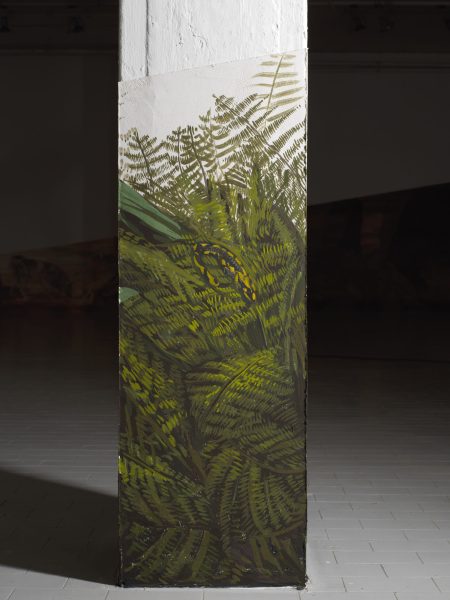Gli Occhi Chiusi (Closed Eyes), 2023
Fresco, 60 square meters approx
Artericambi Gallery , Verona (IT)
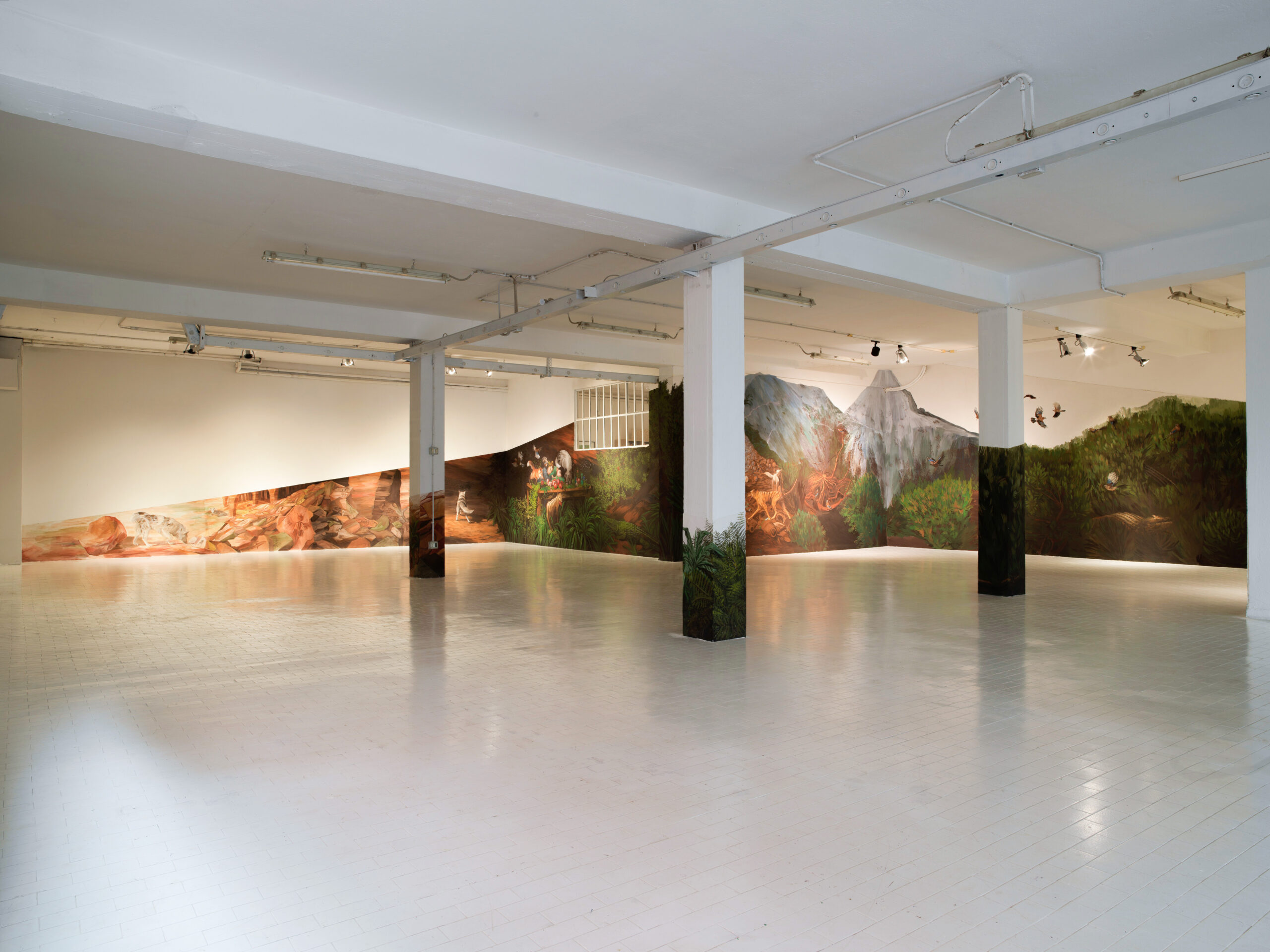
Gli occhi Chiusi was a fresco by Agnese Galiotto at Artericambi gallery.
Fresh mortar and pigments bend together with the industrial architecture of the space, recounting the landscapes of a dreamlike Lessinia* region: the coring of an ancestral past or the projection of a far-off future that we humans can now only imagine with our eyes closed.
At the end of the exhibition, some pieces of fresco have been removed by a team of restorers. Like fossils of the painting they compressed time, telling the story of a work that has been and that has been dismembered in space. The rest was destroyed.
*Lessinia is a mountainous area between Verona, Vicenza and Trento (Italy) characterised by human presence since the second millennium BC. Bird feathers that Neatherthals used to adorn themselves have been found in its caves. The oldest cave paintings in Europe, created by Sapiens and Neanderthals with natural pigments that are still used in painting today, can be found in these same places. The shape of the rocks and the numerous fossils found in Lessinia prove that 50 million years ago the area was covered by a warm sea inhabited by tropical species.
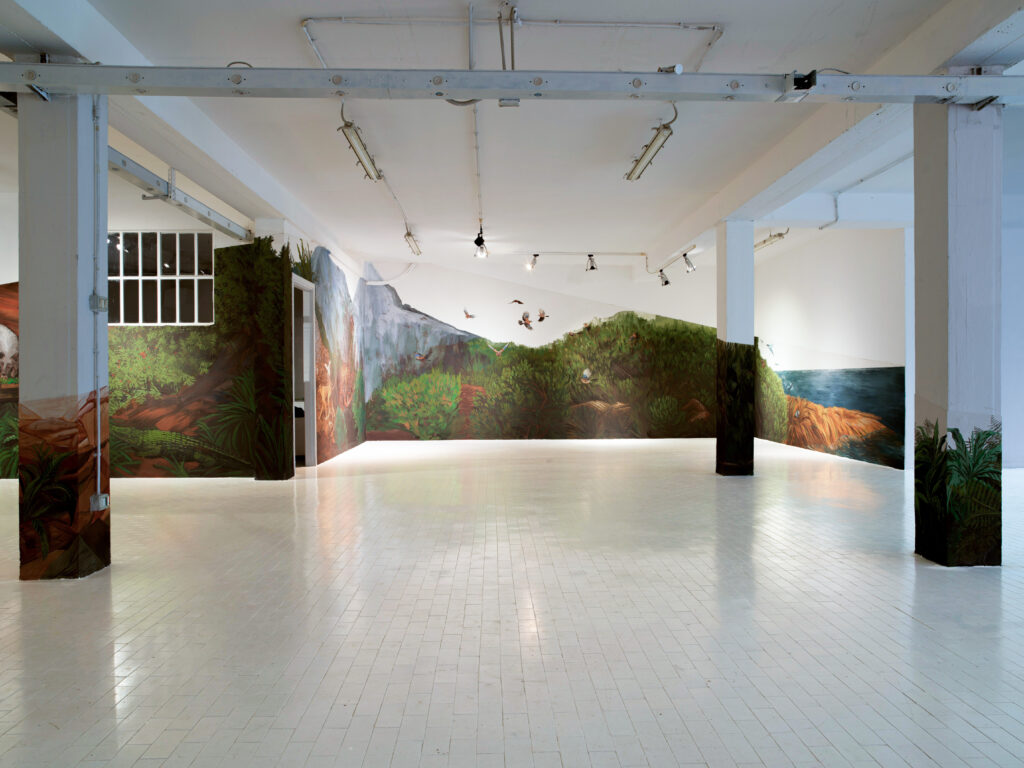
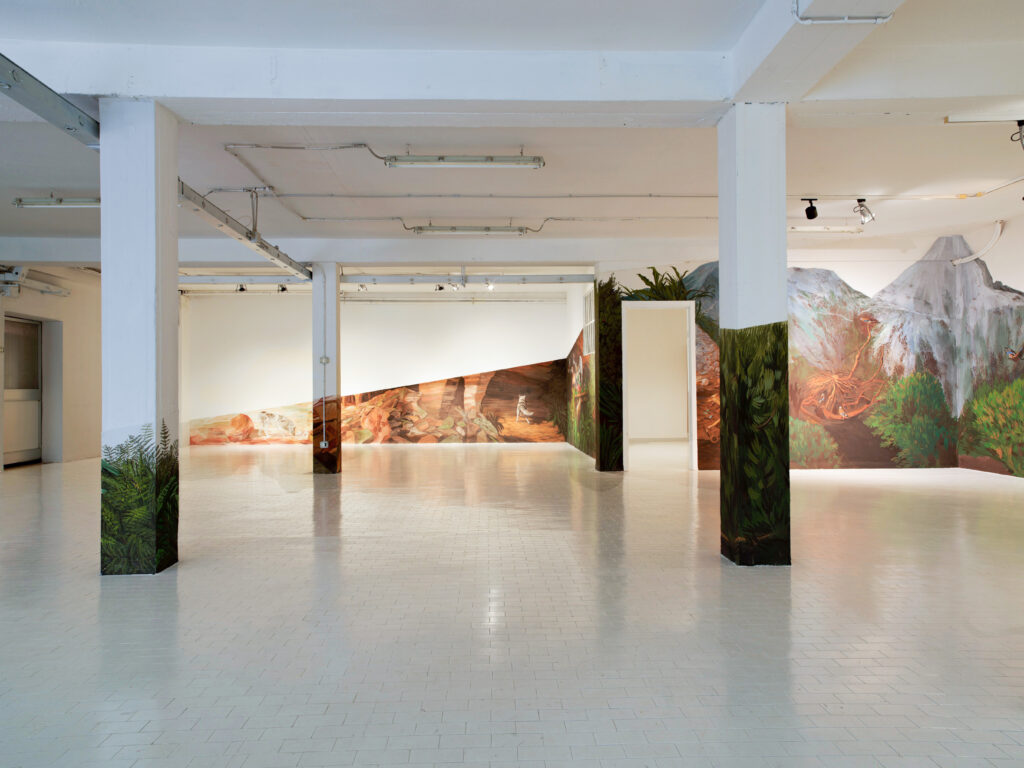

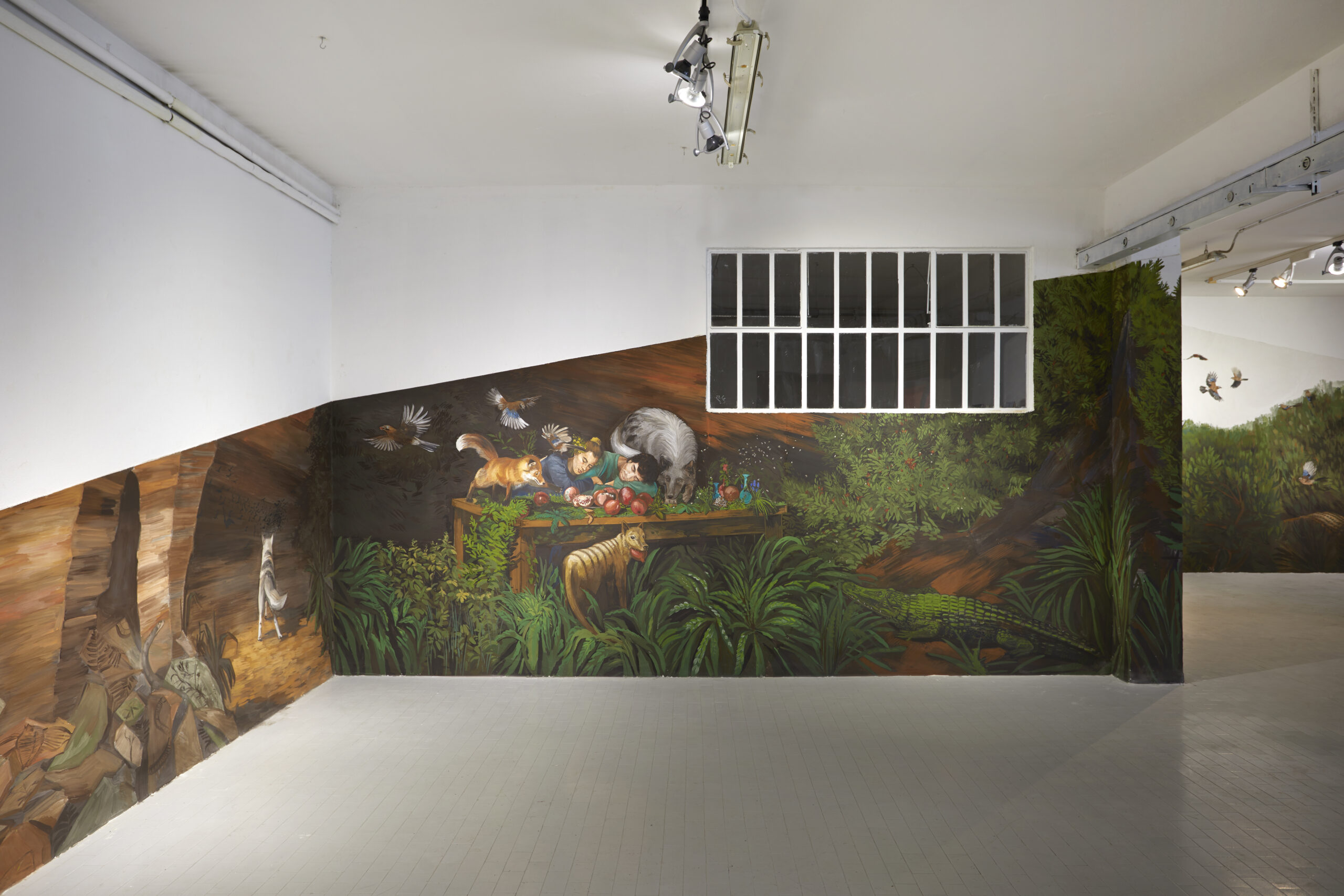
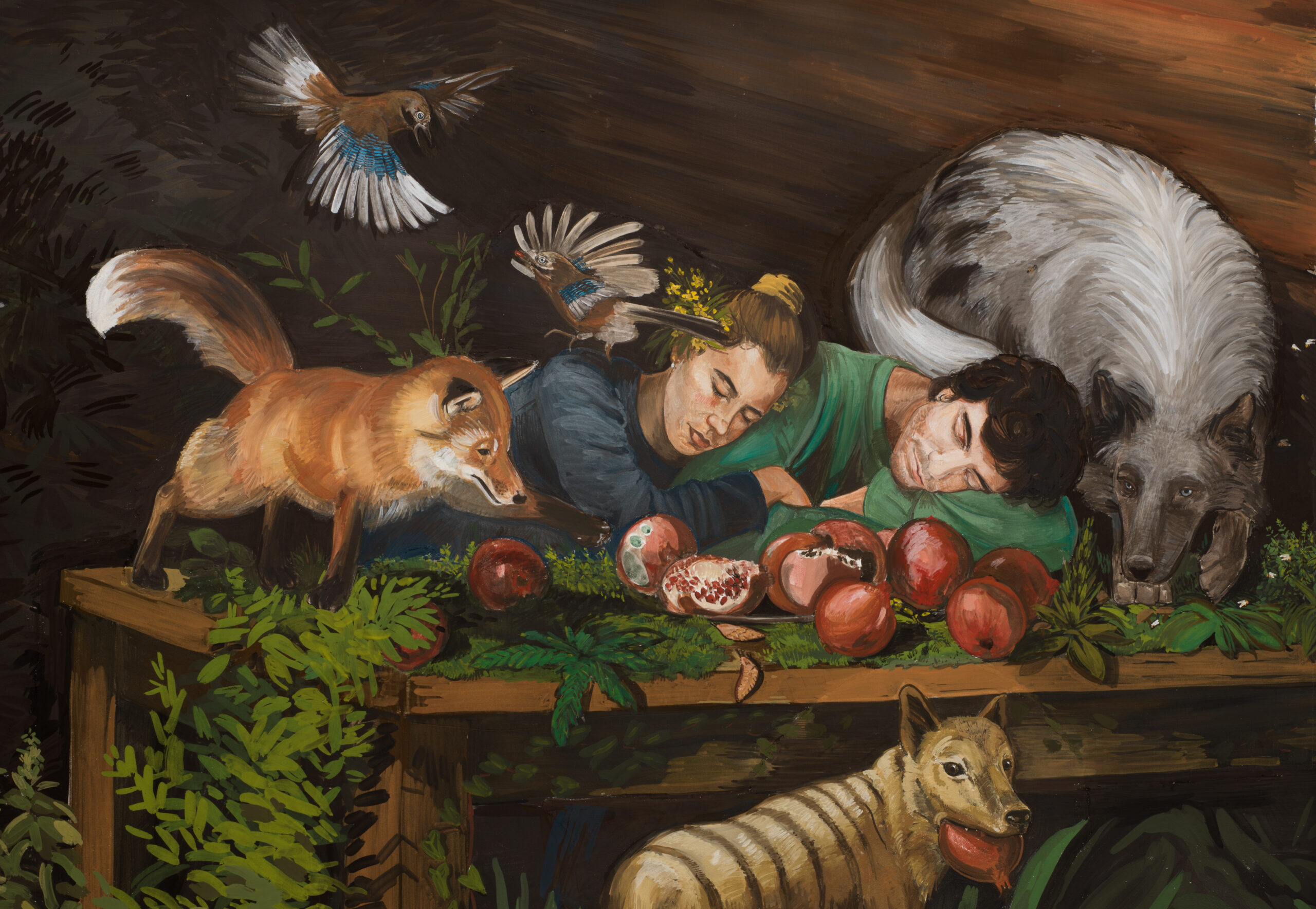
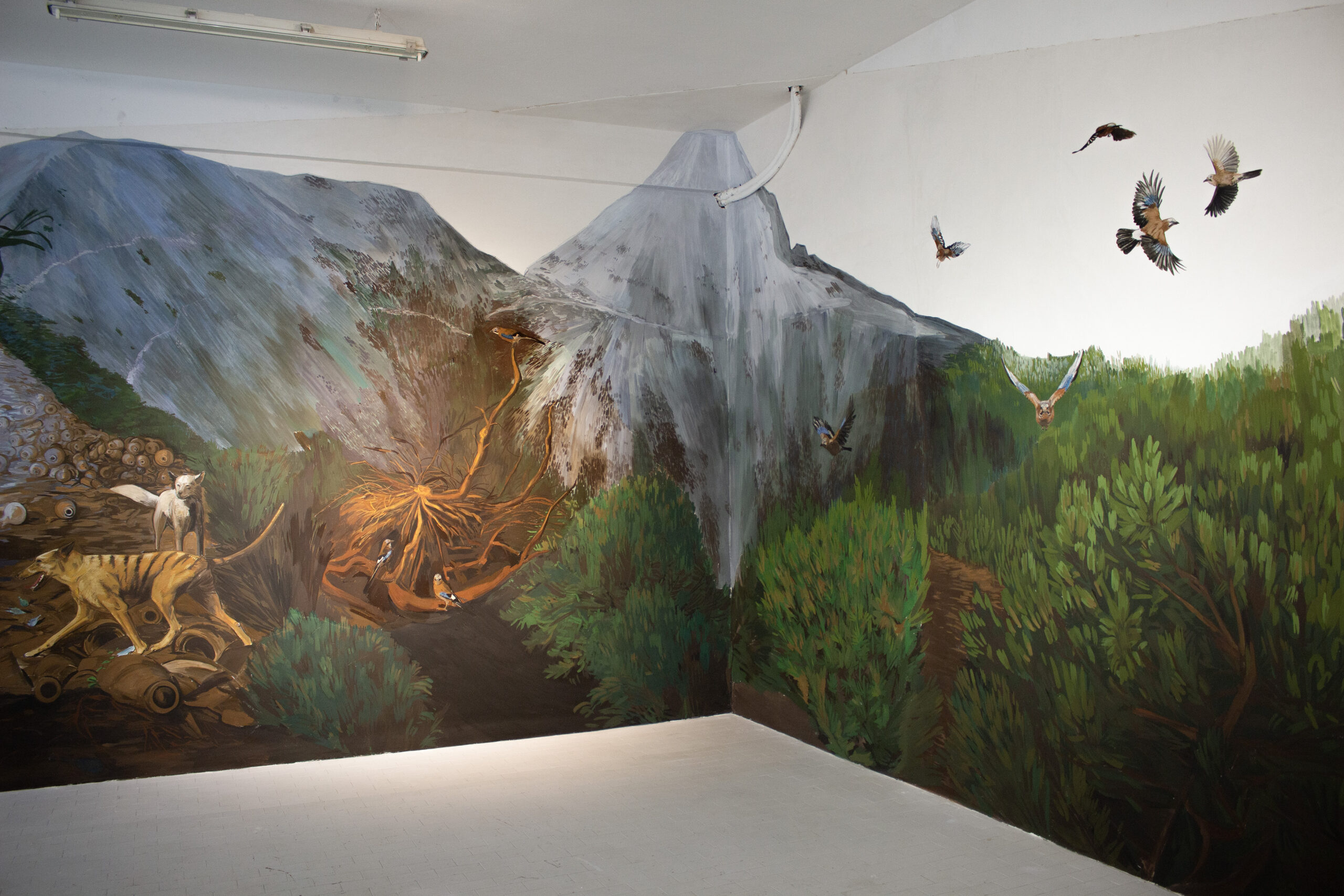
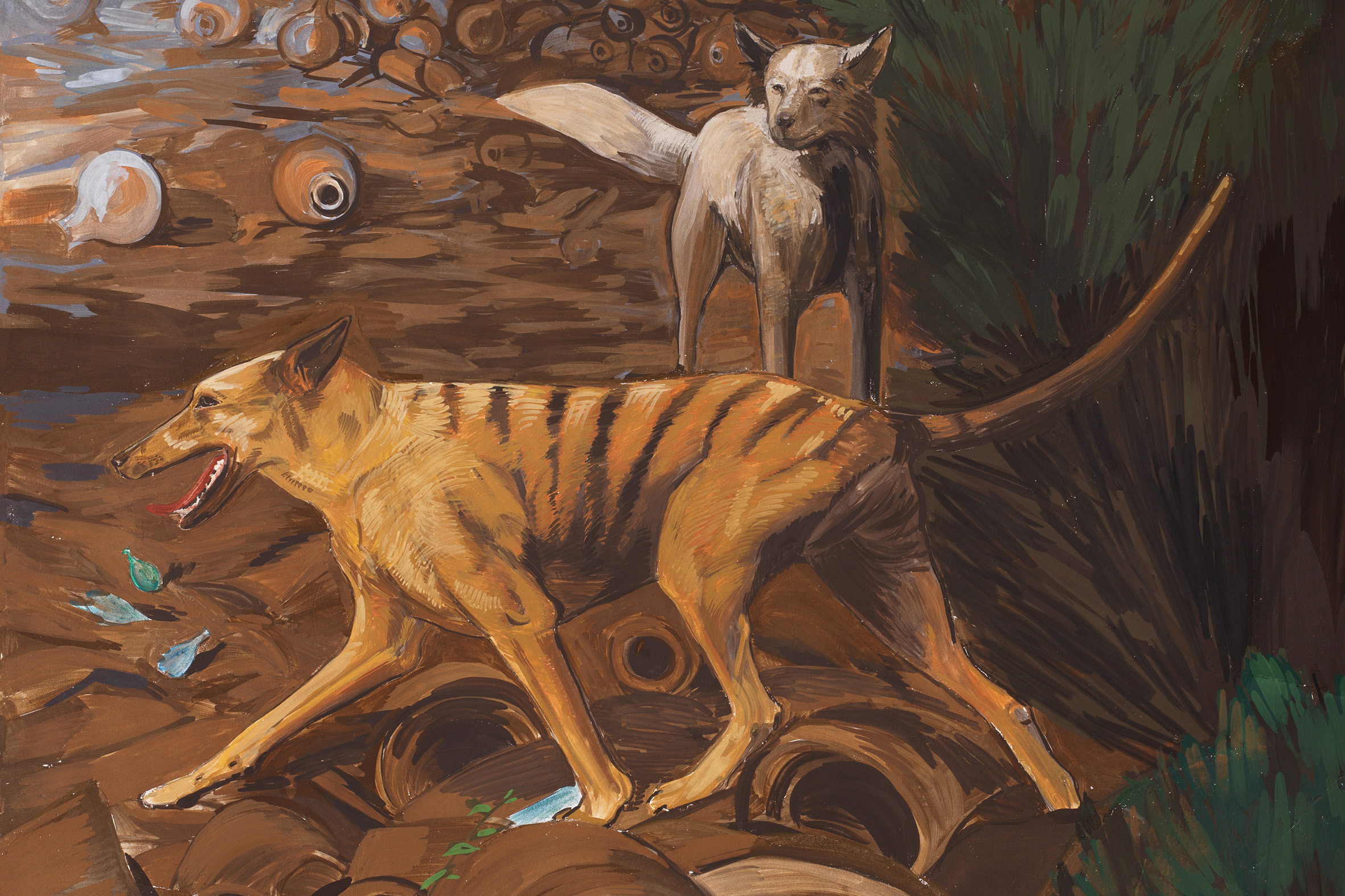
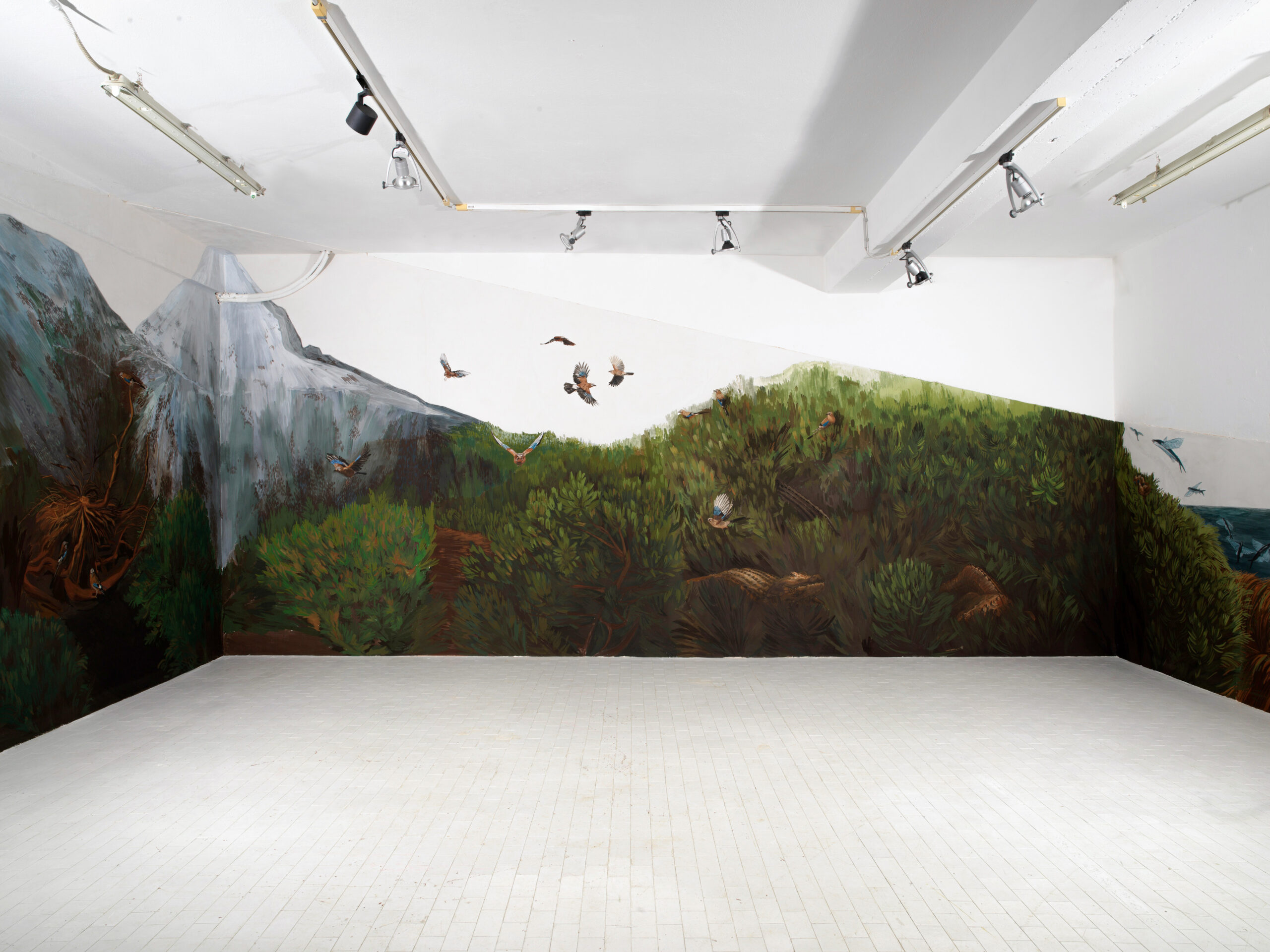
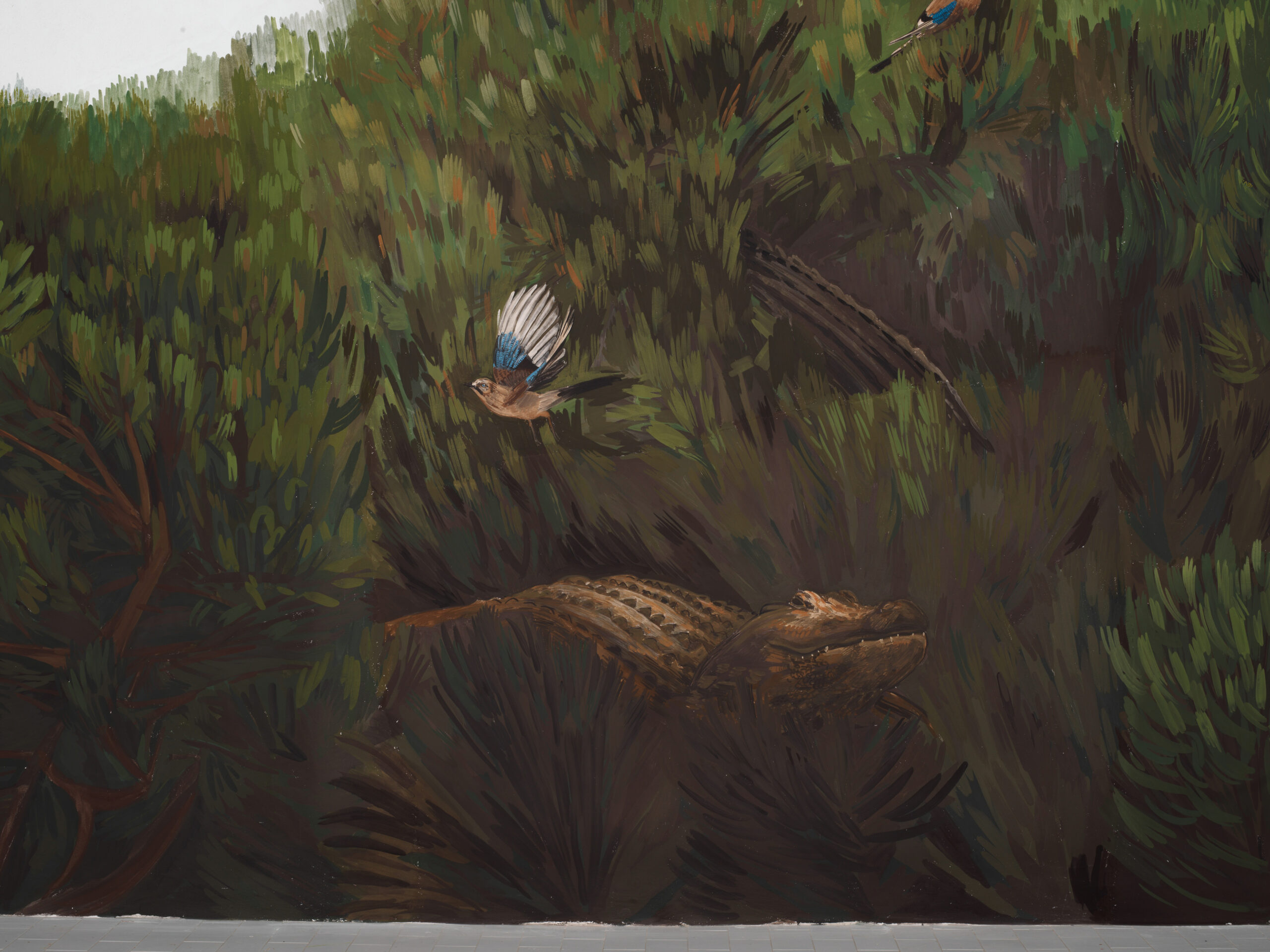
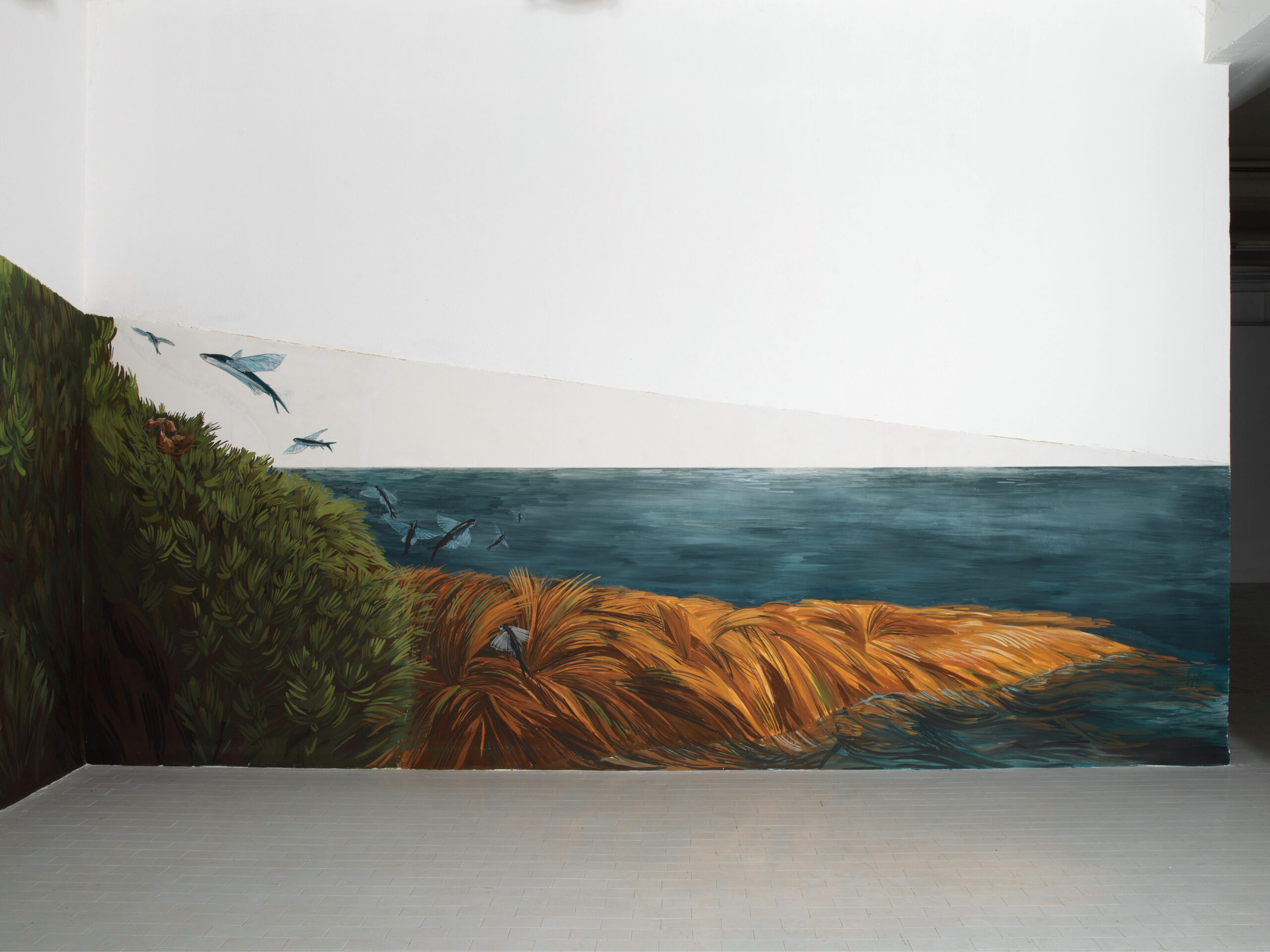
EXHIBITION TEXT
“Since the dogs no longer have an owner, they like to wander around the abandoned quarry. Perhaps it is the smell of some carcass that attracts them, perhaps it is the coolness that is always in here, where the sun never gets in. When they go to the quarry, one at the front and one at the back, snout on the ground and tail in the air, they never go too far. They crawl under the chain that barred access, and stay in the initial part of the tunnels. If the ceiling has collapsed, they think, it might collapse again. They spend their time digging their paws in the midst of those mountains of rubble, in a temple-like silence. Scraping nails and the screeching of dust-covered shards, shattered perhaps for the first time since they broke to the ground, echo through the tunnels.
Sometimes they pull things from the heap with their teeth that they haven’t seen in a long time: dusty old clothes, still smelling of something, but which leaves them in doubt; plastic bags into which they stick their snouts, to lick the crumbs and salt; a glass bottle, which they watch slide along the floor of the cave, following its slope, clinking. Now and then they raise their eyes to the ceiling, and watch the swallows circling, of which they have always been enamoured, as of all animals that know how to move in the sky.
The dogs are now alone most of the time. They walk the mountain roads, day after day recording the gradual hardening of the ground as summer arrives. The sun is very close at certain times of the morning and, like lizards, they lie in the sun with their half-closed eyes, their ears full of the beat of their hearts. The song of birds and insects propagates through space.
When they awaken, they are no longer dogs, but crocodiles, lying motionless in the sun. Their bodies are heavy when they try to drag themselves forward: they seem to walk on their elbows, unable to lift their bellies off the ground. On either side of their snouts they see a pair of hands moving instead of paws, with five thick, clawed fingers clawing at the grass on which they had fallen asleep. The sun behind them casts their gigantic shadows on the grass: their heads are huge and elongated, their backs warty, their tails as wide as tree trunks.
The two dogs look at each other, and they think it is frightening what has happened. They continue their walk in the waning sun, now much more slowly. Their tails whip through the evergreen bushes, breaking thorny brambles. The sight of them puts small birds to flight, which flutter their wings.
Now that they no longer have an owner and are no longer dogs, they can’t return to the place from which they came. They find themselves in a small clearing, where the sun’s rays can penetrate through the treetops. The wind rises and then falls again, then rises again, as the breaths join and separate in different directions. Crocodiles crouch under a pine tree, camouflaging themselves in the green leaves with their armour. Nestled between their eyelids, which, rather than folds of skin, look like bas-reliefs of stone, their yellowish eyes look around in silence.
Something is moving between two trees. Branches rise and bend, some make signs of breaking. Two people, one after the other in single file, enter the clearing exchanging a few sentences in low voices, as if they were a little tired of talking. They have rucksacks on their shoulders, which they drop as they sit on the grass with crossed legs. They pull pomegranates out of their backpacks, which they split with a Swiss knife. They dig into the fruit with their fingers, but many seeds fall out and they have to search for them on the ground, which amuses them at first. Eventually they get bored with this long operation, and lie down on the grass, leaving some pomegranates to be cleaned and others open and still full of seeds. Their heads are close together, their faces sweating in the sun. After a while they say nothing to each other, they already seem to be asleep.
It is the insects that first approach the sleeping ones, attracted by the sweetness of the fruit and the sourness of their skin. Bees buzz over the cracked pomegranates, flies and ants walk all over them, especially on their necks and faces, causing them to twitch a little, but they do not wake up. All around flutter the jays, which call to each other with a shrill cry, then glide to the ground and catch an insect or a grain in their beaks, as the rind of the closed pomegranates is too hard to crack.
A fox approaches at a brisk pace, its feathery tail swaying, as the birds take flight. It is not attracted by the fruit but by the abandoned rucksacks, into which it slips first its head, then part of its torso. She finds something, a plastic bag with the remains of a lunch inside, and holding it tightly between her teeth she jealously carries it behind a bush. While the fox insinuates its snout into an emptied tin, other dogs, with long tails and striped coats, walk into the clearing. They look around for a moment, sniff the scent of sleeping boys, search with their snouts among the pomegranates and tattered rucksacks, and then leave.
The crocodiles would like to get closer to the two boys, but evening begins to fall, and they feel that they are getting more and more tired and cold. They continue on their way, descending slowly down the mountain, not quite knowing where to go.
The vegetation is changing around them. They now advance through bushes of faded grass, dwarf saplings, solitary flowers growing in the middle of the dunes, and are constantly swept by the wind, which is now blowing hard on them. They listen to the voice of the sea, and under their paws they feel the dampness and cold of the sand. They reach the shore and dive in, the moon making the scales of their armour glisten. A flock of flying fish takes a leap over the surface of the water, and gliding through the spray hides the horizon line for a few seconds. The two dogs sink into the sea and merge with the sand. ”
Elvira Fiore
